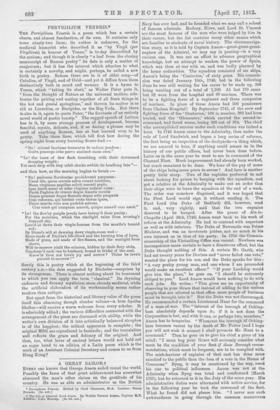PERVIGILIUM VENERIS. 1 THE Pervigilium Veneris is a poem which has
a certain charm, and almost fascination, of its own.. It contains only some ninety-two lines; its author is unknown, for the medieval humorist who described it as "by Virgil (per Virgilium) in honour of Venus," is to-day discredited by the serious; and though it is clearly "a leaf from the closing manuscript of Roman poetry" its date is only a matter of
conjecture ; but it has the interest which attaches to what is certainly a novelty, and might, perhaps, be called a new birth in poetry. Echoes there are in it of older song—of Catullus, of Virgil, and of Ovid—and yet it differs from them distinctively both in mood and manner. It is a hymn to Venus, which "taking its start," as Walter Pater puts it,
"from the thought of Nature as the universal mother, cele- brates the pairing and mating together of all fresh things in the hot and genial springtime," and therein its matter is as
old as Lucretius, or Euripides, or the Rig-Veda. But there is also in it, again to quote Pater, " the foretaste of an entirely novel world of poetic beauty." The rugged speech of Latium has in it, by some strange process of development, become fanciful, mystic, delicate, and, if so daring a phrase may be used of anything Roman, has at last learned even to be pretty. Take these lines, which tell first how during the spring night from every bursting flower-bud :— "En ! mieant lacrimak trementes do caduco pondere : Guth,. praeceps orbe parvo sustinet cams sues."
"Lo! the tears of dew flash trembling with their downward drooping weight : Yet each drop with tiny orbit cheeks awhile its headlong fate "- and then how, as the morning begins to break :— " En ! pudorem florulentae prodiderunt purpurae:
Timor ille, quem seronis astra rorant noctibus,
Mane virgineas papillas solvit umenti peplo. Ipsa jussit mane ut udae virgines nulmnt rosae Facta Paphies de cruore deque Amoris °sculls Deque gemmis deque flammis deque soils purpuris Cras ruborem, qui latebat vests tectus ignea, Unice marita vote non pudebit solver°, eras amet qui nunquam amavit, quique amavit eras amet."
"Lo! the flow'ry purple jewels have betray'd their purity : For the moisture, which the starlight rains from evening's tranquil sky, Loos'd at dawn their virgin-bosoms from the mantle's humid red:
By Dione's will at dawning dewy virgin-roses wed— Roses made of Paphia's life-blood and the burning kiss of Love, Made of gems, and made of fire-flames, and the sunlight from above,
Will to-morrow yield the crimson, hidden by their fiery stole, Unasham'd each one to husband, bound in bridal of the soul.
Know'st thou not love's joy and Borrow? Thine be love's pursuit to-morrow !"
Surely this is poetry which at the beginning of the third
century A.D.—the date suggested by Bacheler—surprises by its strangeness. There is almost nothing about its treatment to which you can apply the term "classical." Its rhyming cadences and dreamy mysticism seem already medieval, while the artificial elaboration of its workmanship seems rather
modern than antique.
But apart from the historical and literary value of the poem
itself this charming though slender volume—a true lepidus libellus—will receive a warm welcome from every scholar. It is admirably edited ; the various difficulties connected with the arrangement of the poem are discussed with ability, while the writer's own division of it into artistically balanced strophes is of the happiest; the critical apparatus is complete ; the original MSS. are reproduced in facsimile ; and the translation well reflects the grace and delicacy of the original. And then, too, what lover of ancient letters would not hold out an eager hand to an edition of a Latin poem which is the work of an Assistant Colonial Secretary and comes to us from Hong Kong ?






















































 Previous page
Previous page